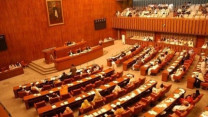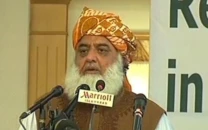PM calls for equipping police with high-technology
Imran tasks science minister with ending ‘Thana Culture’

Prime Minister Imran Khan. PHOTO: PID/FILE
In a meeting with the minister, the premier directed him to initiate the project aiming to bring a holistic and comprehensive reform at the level of police stations.
In the first phase, 10 police stations of the Islamabad Police will be modernised. Calling the ministry of utmost importance, the PM said that the future of the country depends on the understanding of knowledge and technology.
The premier’s decision came in response to Chaudhry’s recommendation that a pilot project for adopting and reforming 10 police stations be initiated in the federal capital.
The minister informed the premier that a steering committee of experts will be constituted that would work out details for a realistic and tangible work-plan for the police station as ‘service delivery centres’.
Chaudhry added that the committee would hand over their plan in a month to the Islamabad Police, which will implement it in six months while the body will remain engaged in monitoring and advisory capacity. “The modern, reformed and technologically equipped police station should be designed and operationalised as a service centre instead of existing outdated, unfriendly and fortress type atmosphere,” Chaudhry stated in the concept paper dealing with the ‘New Modern Police Stations’.
The paper not only identifies the existing problems being faced by the masses, earlier efforts in this area but also the future roadmap. “Police station is pivotal to police reforms,” Chaudhry said, “no change in police working and public perception of police is possible without bringing change at the level of the police station.”
Before proposing any solution or reform effort, he identified a range of problems – environment of police station, attitude of the staff at the police station, having inadequate technology for service provision, insufficient resources and not having a culture of service – embedded at the level of police stations.
While dividing problems into five categories in the pilot project paper, he claimed that the environment of the police station is hostile and uncomfortable for the general public, the attitude of the staff at police station level is known to be rude and indifferent to public and most of the police stations are outdated and using
redundant technology.
In addition, he stated, the police stations are mostly not provided with sufficient technical and useful resources to manage their workload and, importantly, the “police stations exhibit a feeling of fear and awe instead of a service delivery
system.”
Chaudhry said that police stations have remained a subject of a number of reforms but “most of these proved to be cosmetic and short-lived.” There were some serious efforts, he said, but most of them were aimed at by-passing the police station instead of directly addressing the issue.
“The reforms in K-P resulted in the formation of Police Access Lines (PAL) and Police Access Services (PAS), which did result in better service delivery but did not change the police station from the core,” he stated. “Similarly the front desk service in Punjab and the Facilitation Centre in Islamabad take services out of police station
instead of changing the police station,” he said.
Giving the future roadmap, he said a comprehensive reform was needed at the police station level in light of the problems identified and to expand the scope of earlier efforts. He said that there was a dire need of designing police stations as service centres and equipping them with the modern technology as well as the staff, who are trained both in official as well as public dealing.



















COMMENTS
Comments are moderated and generally will be posted if they are on-topic and not abusive.
For more information, please see our Comments FAQ